Catalog 2012-2014 - Anderson University School of Theology
Catalog 2012-2014 - Anderson University School of Theology
Catalog 2012-2014 - Anderson University School of Theology
You also want an ePaper? Increase the reach of your titles
YUMPU automatically turns print PDFs into web optimized ePapers that Google loves.
Degree Programs — Theological Field Education, continued<br />
Theological Field Education<br />
STATEMENT OF PHILOSOPHY<br />
The integration <strong>of</strong> the classroom experience with the practice <strong>of</strong> ministry is a major concern <strong>of</strong> the<br />
seminary. Therefore, several areas <strong>of</strong> supervised theological field education are required. With supervision<br />
from pastoral supervisors, mentors, associates in ministerial training, and others in the practice <strong>of</strong> Christian<br />
ministry, students are given the opportunity to interpret, translate, and integrate knowledge gained in the<br />
classroom into the practice <strong>of</strong> ministry in various ministry settings.<br />
Theological Field Education primarily occurs in the local congregation, though many other ministry settings<br />
<strong>of</strong>fer constructive contexts for supervision and mentoring. The internship program brings students together<br />
with selected field supervisors for supervised assignments in ministry. Additional non-parish experiences are<br />
available. These are in institutional chaplaincies, national parks ministries, global mission ministry, and urban<br />
ministries. In these contexts, students lessen the distance between the classroom and the practice <strong>of</strong> ministry.<br />
CLINICAL PASTORAL EDUCATION<br />
The <strong>School</strong> <strong>of</strong> <strong>Theology</strong> is a member <strong>of</strong> the Association for Clinical Pastoral Education, an organization<br />
<strong>of</strong> accredited clinical pastoral training opportunities for theological students and clergy. There are more<br />
than 350 approved CPE sites in this county in clinical, medical, and psychiatric hospitals, parishes, prisons,<br />
and other settings. A basic unit <strong>of</strong> CPE consists <strong>of</strong> at least 300 clinical hours and 100 educational hours.<br />
The basic unit is available in a variety <strong>of</strong> forms to meet students’ scheduling concerns:<br />
• Traditional: daily, 40 hours per week for 10 weeks.<br />
• Extended: 16-20 hours per week for 20-24 weeks.<br />
• Other variations<br />
Academic credit is given for the satisfactory completion <strong>of</strong> such an accredited program.<br />
FIELD EDUCATION<br />
Master <strong>of</strong> Divinity students will complete two Field Education courses, THFE 7750 and THFE 7760.<br />
Each course will immerse the student in the life <strong>of</strong> a congregation; if the student is not serving in a pastoral<br />
role, the Director <strong>of</strong> Field Education will assign the student to an appropriate congregation. Each student will<br />
work with a Pastoral Mentor, chosen and trained by the <strong>School</strong> <strong>of</strong> <strong>Theology</strong> to guide learning experiences.<br />
Both courses will emphasize leadership in the church; church administration; and theology and leadership<br />
<strong>of</strong> worship, evangelism, and biblical reconciliation. These two courses are built on the CPE model,<br />
with didactics, clinical experience, and peer group reflection. Students will develop a portfolio to demonstrate<br />
their competencies in leadership, administration, worship, evangelism, and biblical reconciliation; the<br />
portfolio will be valuable when seeking placement in ministry.<br />
SERVICE OPPORTUNITIES<br />
Service opportunities are made available through regular courses, special seminars, and campus guests.<br />
Service in the urban settings occurs in a rich variety <strong>of</strong> contexts, congregational styles, ministry models, and<br />
leadership styles.<br />
<strong>Anderson</strong> <strong>University</strong> <strong>School</strong> <strong>of</strong> <strong>Theology</strong> will cooperate with a variety <strong>of</strong> programs which provide<br />
exposure to and training for ministry. Opportunities include:<br />
• Special assignments in Theological Field Education, including national parks ministry;<br />
scouting; chaplaincy; Appalachian ministries, with a focus on rural ministry; and internships,<br />
with a focus on smaller churches.<br />
• Other internship/contextual education opportunities, including cross-cultural ministry<br />
and research, clinical pastoral internship, internship in educational ministry, or internship<br />
in worship.<br />
Believing that knowledge is to be tested in experience, internships, practicums, clinical training, workshops,<br />
and field education are viewed as essential curricular ingredients.<br />
34 <strong>Anderson</strong> <strong>University</strong> <strong>School</strong> <strong>of</strong> <strong>Theology</strong> <strong>Catalog</strong>, <strong>2014</strong>-2015


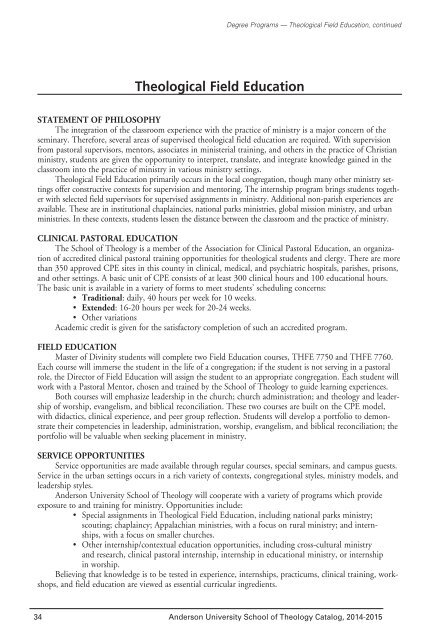
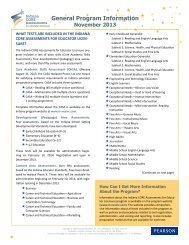

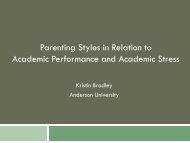

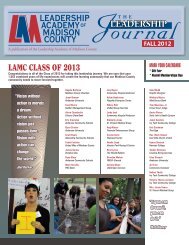
![Brand Continuity Guide [PDF] - Anderson University](https://img.yumpu.com/45286018/1/184x260/brand-continuity-guide-pdf-anderson-university.jpg?quality=85)

![Affidavit of Support [PDF]](https://img.yumpu.com/41163197/1/190x245/affidavit-of-support-pdf.jpg?quality=85)
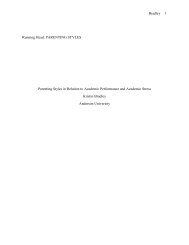
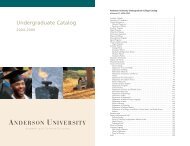
![Employment Interest Form [PDF] - Anderson University](https://img.yumpu.com/36433548/1/184x260/employment-interest-form-pdf-anderson-university.jpg?quality=85)
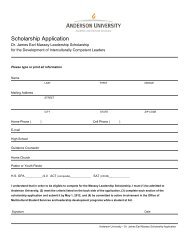
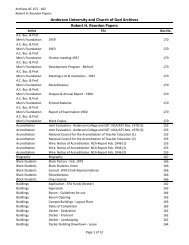
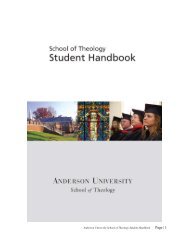
![the Recommended Reading List [PDF] - Anderson University](https://img.yumpu.com/34123085/1/190x245/the-recommended-reading-list-pdf-anderson-university.jpg?quality=85)